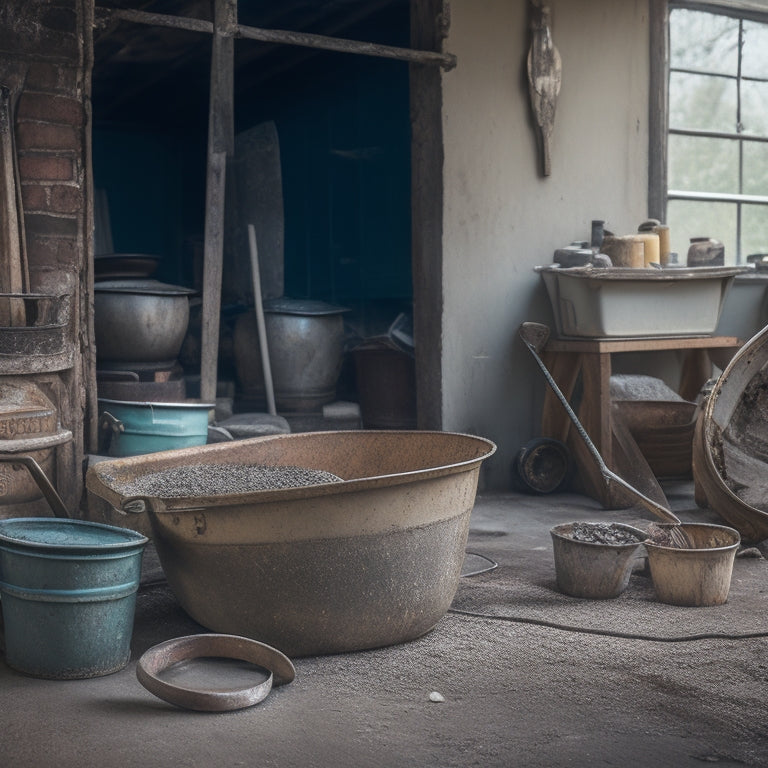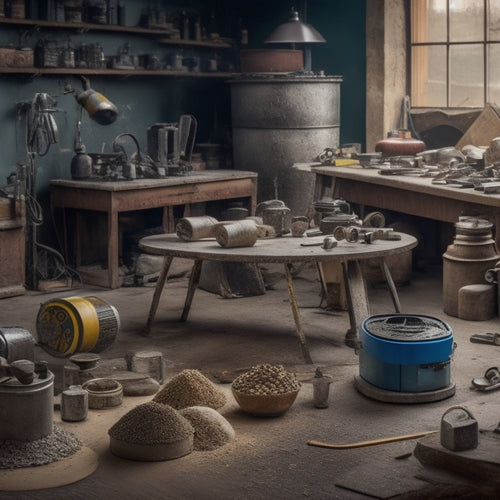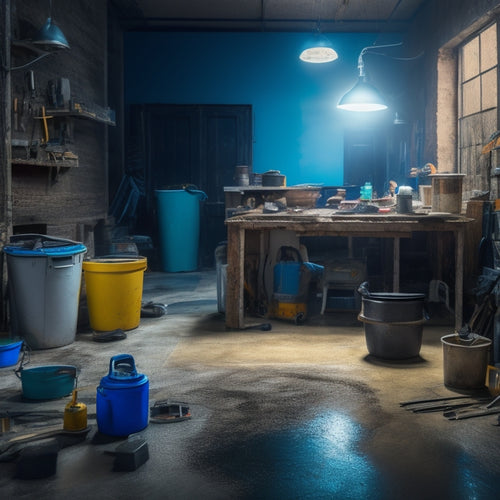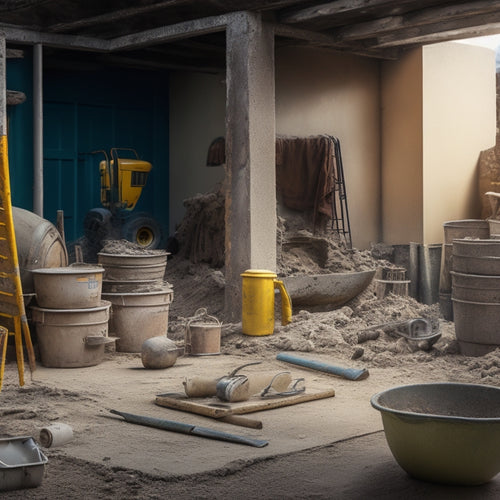
Top Tools for Mixing Concrete at Home
Share
When mixing concrete at home, you'll need a range of tools to guarantee a successful operation. Start with essential equipment like a high-quality concrete mixer, shovels, trowels, and mixing paddles. Don't forget personal protective gear like gloves, safety glasses, and a dust mask. Top brands like Marshalltown, DeWalt, and Makita offer durable and efficient mixing tools. For hand tools, opt for sturdy trowels, levels, and finishing tools. Power tools like electric mixers and high-torque mixing drills can tackle heavy-duty projects. With the right tools and safety gear, you'll be well-equipped to tackle your project - and exploring further will help you optimize your concrete mixing process.
Key Takeaways
• Invest in a high-quality concrete mixer, as it's crucial for successful mixing operations at home.
• Have a range of mixing tools on hand, including shovels, trowels, and mixing paddles, for efficient mixing.
• Ensure a reliable water supply and accurate batching measuring system for precise mixing ratios.
• Wear personal protective equipment (PPE) like gloves, safety glasses, and a dust mask to mitigate risks.
• Regularly maintain and clean your mixing equipment to prevent breakdowns and ensure optimal performance.
Essential Mixing Equipment Checklist
To guarantee a successful concrete mixing operation, you'll need the following essential equipment.
A high-quality concrete mixer is the backbone of your operation, and it's important to choose the right type for your project. You'll also need a range of mixing tools, including shovels, trowels, and mixing paddles. Additionally, a reliable water supply and a measuring system for accurate batching are essential.
Don't forget to invest in personal protective equipment, such as gloves, safety glasses, and a dust mask, to protect your safety during the mixing process.
Proper equipment maintenance is also important to prevent breakdowns and maintain peak performance. Regularly inspect and clean your mixer, and perform routine maintenance tasks, such as lubricating moving parts and replacing worn-out components.
By mastering mixing techniques, such as the 'slump test' and 'washout test', you'll be able to achieve the perfect mix.
Top Concrete Mixing Tool Brands
When selecting the right mixing tools for your concrete project, you'll want to think about brands that offer high-quality, durable products, with industry leaders like Marshalltown, DeWalt, and Makita consistently delivering exceptional performance.
These popular brands have established themselves as trusted names in the construction industry, and for good reason. Marshalltown's concrete finishing tools, for instance, are renowned for their durability and precision, making them a top choice among professionals.
DeWalt, on the other hand, is known for its powerful and efficient mixing drills, which can tackle even the toughest concrete mixes. Makita, meanwhile, offers a range of high-torque mixing tools that are designed to withstand the rigors of heavy-duty use.
When comparing these brands, you'll notice that each has its strengths and weaknesses. Marshalltown excels regarding precision and control, while DeWalt is all about raw power and speed. Makita, meanwhile, strikes a balance between the two.
Ultimately, the best brand for you will depend on your specific needs and preferences. By considering the pros and cons of each, you can make an informed decision and choose the mixing tools that will help you achieve professional-grade results.
Best Hand Tools for Concrete
You'll find that the right hand tools can make all the difference in achieving a smooth, even finish. For concrete projects that require more finesse, a reliable set of hand tools is just as important as the mixer itself.
When it comes to mixing concrete, having the right hand tools can help you develop advanced mixing techniques, guaranteeing a consistent and high-quality finish. A sturdy trowel, for instance, allows for precise control over the concrete flow, while a level guarantees your pour is even and accurate. A set of finishing tools, such as edgers and floats, help you achieve a smooth, polished finish.
Proper tool maintenance is also essential to extend the lifespan of your hand tools. Regularly clean and lubricate your tools to prevent rust and corrosion. Store them in a dry place, away from direct sunlight, to prevent damage.
Power Tools for Heavy Mixing
Heavy-duty concrete projects require the muscle of power tools, which can tackle massive mixing tasks with ease and speed, making them an indispensable asset for large-scale construction projects. When you're dealing with large quantities of concrete, you need a reliable powerhouse to get the job done efficiently. That's where electric mixers come in – robust machines designed to handle heavy mixing tasks with precision and control.
These mixers are available in various sizes and capacities, so you can choose the right one for your project's specific needs.
When working with electric mixers, you'll need sturdy mixing buckets that can withstand the intense mixing action. Look for buckets made from heavy-duty materials, such as steel or durable plastics, that can handle the weight and stress of heavy concrete mixing.
With the right power tool and mixing bucket combination, you'll be able to tackle even the most demanding concrete projects with confidence. By investing in high-quality power tools, you'll save time, energy, and resources, ensuring your project is completed efficiently and to the highest standards.
Safety Gear for Concrete Work
As you switch from heavy mixing to handling wet concrete, it's crucial to don the right safety gear to protect yourself from the harsh chemicals and physical hazards that come with concrete work. You're not just dealing with messy cement and water; you're working with substances that can cause skin irritation, respiratory issues, and even long-term health problems.
To guarantee your safety, you'll need the right personal protective equipment (PPE). Here are the essentials:
| Safety Gear | Purpose | Recommendation |
|---|---|---|
| Concrete Dust Masks | Filter out airborne particles | Look for masks with a 99.97% filtration rate |
| Safety Goggles | Protect your eyes from splashes | Choose goggles with anti-fog coating for clear visibility |
| Heavy-Duty Gloves | Prevent skin irritation and cuts | Select gloves with waterproof and puncture-resistant materials |
Frequently Asked Questions
Can I Mix Concrete in a Plastic Bucket or Only Metal?
When it comes to mixing concrete, you're wondering if a plastic bucket is a viable option or if metal is the only way to go.
Here's the deal: plastic mixing containers can work, but their durability is a concern.
If you do choose plastic, make sure it's heavy-duty and won't crack or break under the weight and rigors of mixing concrete.
How Do I Properly Clean My Mixing Tools After Use?
As you emerge from the concrete jungle, victorious but exhausted, you're left with an essential task: cleaning your battle-worn mixing tools.
Don't let dried concrete harden your progress - use a wire brush to scrub off excess, then soak in warm soapy water.
For tough residue, employ a vinegar and water solution.
Proper cleaning techniques and tool maintenance guarantee your arsenal remains in top condition, ready for the next mixing conquest.
Can I Use a Mixing Drill With a Wooden Handle?
When using a mixing drill, you're likely wondering if a wooden handle is durable enough for the task.
The good news is that it can be a great option. The benefits of a mixing drill lie in its ability to tackle heavy mixes with ease, and a wooden handle can provide a comfortable grip.
However, you'll want to guarantee the handle is sturdy and well-maintained to withstand the rigors of mixing concrete.
What Is the Ideal Temperature for Mixing Concrete Outdoors?
When you're mixing concrete outdoors, you need to take into account the ideal weather conditions.
Temperature plays a vital role in the curing process. If it's too hot, the concrete will set too quickly, leading to weak spots. On the other hand, if it's too cold, the process will slow down, affecting the final product.
You're aiming for a temperature between 50°F and 70°F (10°C and 21°C) for best results. Anything outside this range can compromise the concrete's strength and durability.
Can I Reuse Concrete That Has Been Mixed but Not Used?
Coincidentally, you're wondering about reusing mixed-but-unused concrete just as you're about to pour it down the drain.
Stop right there! You can't reuse concrete that's been mixed but not used. Once mixed, concrete starts to set, and its chemical reactions can't be reversed.
Recycling concrete isn't an option here, as it affects concrete longevity. Instead, dispose of it properly and mix a fresh batch to guarantee ideal strength and durability.
Don't compromise on quality – it's not worth the risk.
Conclusion
With the right tools, you're ready to tackle any concrete mixing project at home.
For instance, consider a DIY homeowner who used a drill mixer to prepare concrete for a backyard patio.
By following the essential equipment checklist and investing in quality tools from top brands, they were able to achieve a smooth, professional finish - and saved hundreds of dollars on labor costs.
By following these guidelines, you can achieve similar success and take pride in your handiwork.
Related Posts
-

Top DIY Concrete Grinding and Polishing Tools
When selecting DIY concrete grinding and polishing tools, you'll want to take into account a range of factors to guar...
-

Essential Tools for Epoxy Concrete Floor Repair
You'll need a thorough arsenal of specialized tools to guarantee a successful epoxy concrete floor repair. Floor prep...
-

What Tools Are Needed for Concrete Wall Foundations
You'll need a thorough array of tools and equipment to construct a concrete wall foundation that meets structural int...


